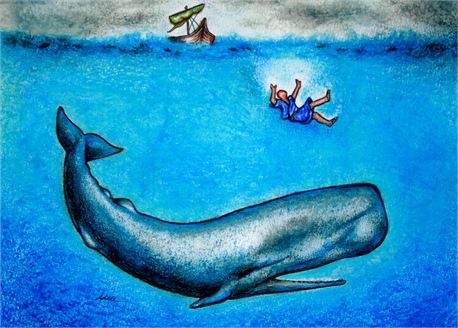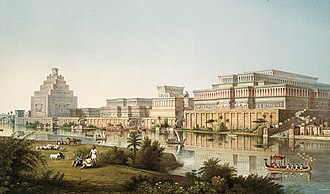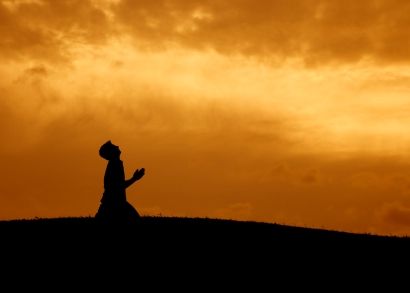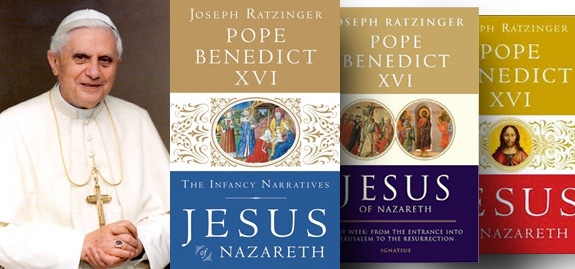
A few years ago, I visited a museum in Eden on the far south coast of NSW, and was told of a sailor who had been swallowed by a whale. Apparently, the whale was killed and its body opened up, revealing the sailor, alive, but somewhat the worse for wear as a result of the gastric juices within the whale’s stomach. The sailor was said to have lived many years after his release from the whale’s stomach.
Before one too readily accepts this tale of a modern-day Jonah, one might speak to a marine biologist. Apparently only a sperm whale has a throat large enough to swallow a human being.
There have also been accounts of persons being momentarily engulfed in the mouth of a whale, and spat out.

MIRACLES
While God can perform miracles, and there are plenty of miracles recorded in the Gospels, not least the Resurrection of Christ following his death and burial – not every unusual event is strictly a miracle. But we pray constantly for miracles – that a mother may deliver her baby safely; that a sick person may recover; that our friend may find a better paying job, or pass an exam; that our children and grandchildren form good friendships; that the spouses in a troubled marriage may reconcile; that a friend may return to practice of the faith; that political leaders will be true to their noble calling; that between Russia and China, and their neighbours there may be peace. And there are miracles in the strict sense that happen today, through the intercession of the saints, and at Lourdes and other shrines of Our Lady. At every Mass, there is a miracle at the words of Consecration.
HISTORICITY
The Book of Jonah was completed in its final form in the Persian era, following the return of the exiles from the Babylonian Captivity, after the decree of Cyrus in 538 BC allowing the Jews to return to Jerusalem.
The Book of Jonah can be read as adopting a literary form to convince Jews of the importance of repentance and conversion. Jonah, in the Book of Jonah, is swallowed by a “great fish”. Our Lord refers to Jonah and the “whale” in the context of His death and burial, and Resurrection – but does not comment on the historicity of Jonah being swallowed whole and alive. This is one of those things we are free to form a view about, having regard to the literary form of the Book of Jonah.
To understand the background to the Book of Jonah, one must appreciate that, following the death of Solomon, the Kingdom of Israel was divided between the north, Israel, and the south, Judah. The Assyrians in 722 BC conquered the northern kingdom, Israel, sending many of its inhabitants into exile. Hence the lost ten tribes of Israel. The southern kingdom, Judah, remained independent, and was menaced, but unsuccessfully invaded by the Assyrians. Eventually the southern kingdom, Judah, fell to the Babylonians, who deported many of Judah’s inhabitants in 597-596, and 587-586 BC.

ENEMIES
The Assyrians were enemies of the Jews. The defeat of the invading Assyrians is laconically described in 2 Kings 19:35-36:
And that night the angel of the Lord went forth, and slew a hundred and eighty-five thousand in the camp of the Assyrians; and when men arose early in the morning, behold, these were all dead bodies. Then Sennacherib, King of Assyria, departed, and went home, and dwelt at Nineveh.
The same event is more graphically described by Lord Byron in The Destruction of Sennacherib:
The Assyrian came down like the wolf on the fold,
And his cohorts were gleaming in purple and gold;
And the sheen of their spears was like stars on the sea,
When the blue wave rolls nightly on deep Galilee.
Like the leaves of the forest when Summer is green,
That host with their banners at sunset were seen:
Like the leaves of the forest when Autumn hath blown,
That host on the morrow lay withered and strown.
For the Angel of Death spread his wings on the blast,
And breathed in the face of the foe as he passed;
And the eyes of the sleepers waxed deadly and chill,
And their hearts but once heaved, and for ever grew still!
…
And the widows of Ashur are loud in their wail,
And the idols are broke in the temple of Baal;
And the might of the Gentile, unsmote by the sword,
Hath melted like snow in the glance of the Lord!
NINEVEH
Jonah is told by God to go to Nineveh, the capital of Assyria, to cry out against its inhabitants for their wickedness. Eventually, the reluctant prophet Jonah, after three days and three nights in the belly of the great fish, does go to Nineveh, warning the people of God’s impending punishment. The Ninevites repent, and God forgives them.

GRACIOUS AND MERCIFUL
Jonah had his nose out of joint as a result of God not bringing destruction on the repentant Ninevites! Jonah complains that God is gracious and merciful, slow to anger, abounding in mercy. God replies: “Should I not pity Nineveh, that great city, in which there are more than a hundred and twenty thousand persons who do not know their right hand from their left, and also much cattle?” The nasty, small-minded Jonah is a contrast to gracious and merciful God, slow to anger, abounding in mercy!
REPENTANCE AND CONVERSION
Jonah provides many lessons, but one important lesson is the importance of repentance and conversion. The importance of repentance and conversion is a constant of Scripture. John the Baptist, before Jesus’ public ministry, urges repentance and conversion. St Matthew reports Jesus’ first words at the beginning of his public ministry: “Repent, for the kingdom of heaven is at hand.” At the beginning of St John’s Gospel is recorded the visit of Nicodemus by night, and Jesus’ words: “Unless one is born anew, he cannot see the kingdom of God.”
Traditional practices such as prayer, fasting and almsgiving demonstrate that repentance is not something that happens merely once, but constantly in the life of a Christian. One must change, and change often!
Saints such as St Augustine and St Ignatius of Loyola who led worldly lives demonstrate the importance of repentance and conversion.
The life of a Christian is presented as a journey which involves constantly overcoming oneself so as to embody Christ. That is why JRR Tolkien’s The Lord of the Rings is so great a work of Catholic literature as it shows Frodo moving from the comfort of the Shire on a journey to the Crack of Doom, which involves struggling not merely against exterior forces, but also against himself. The Lord of the Rings is a study of what it means to be a hero, to have changed often.
That is why, on Ash Wednesday, the priest, as he places the ashes on the head of each member of the congregation says – “Repent, and believe in the Gospel” – or “Remember you are dust, and unto dust you shall return”.

PHARISEE AND PUBLICAN
Pope Benedict XVI/Joseph Ratzinger in Jesus of Nazareth captures the significance of Jesus’ preaching of the Kingdom of God, and the response which is conversion and faith, in the account of the Pharisee and the publican:
The Pharisee does not really look at God at all, but only at himself; he does not really need God, because he does everything right by himself. He has no real relation to God, who is ultimately superfluous – what he does himself is enough. Man makes himself righteous. The tax collector, by contrast, sees himself in the light of God. He has looked towards God, and in the process his eyes have been opened to see himself. So, he knows that he needs God, and that he lives by God’s goodness, which he cannot force God to give him, and which he cannot procure for himself. He knows that he needs mercy and so he will learn from God’s mercy, to become merciful himself, and thereby become like God.
BAVARIA UNDER THE NAZIS
At the moment I am reading volume 1 of Peter Seewald’s biography of Pope Benedict XVI, Youth in Nazi Germany to the Second Vatican Council 1927-1965. Pope Benedict grew up in Bavaria at a time when the Nazis were consolidating their control. Pope Benedict’s father was a police officer, intensely anti-Nazi, strong in his practice of the faith. Pope Benedict’s father retired early to avoid co-operation with the Nazi consolidation of power. How did the family survive in such an unpromising environment when so many around them were making “compromises”? Only by the fervent practice of their faith.
ONE CANNOT RUN AWAY
Jonah, dog in the manger that he is, illustrates the importance of repentance and conversion. As the late 19th century English poet Francis Thompson says in The Hound of Heaven, echoing Jonah, one cannot run away from God, nor from God’s graciousness, and abundance of mercy.
Michael McAuley
4 March 2022
